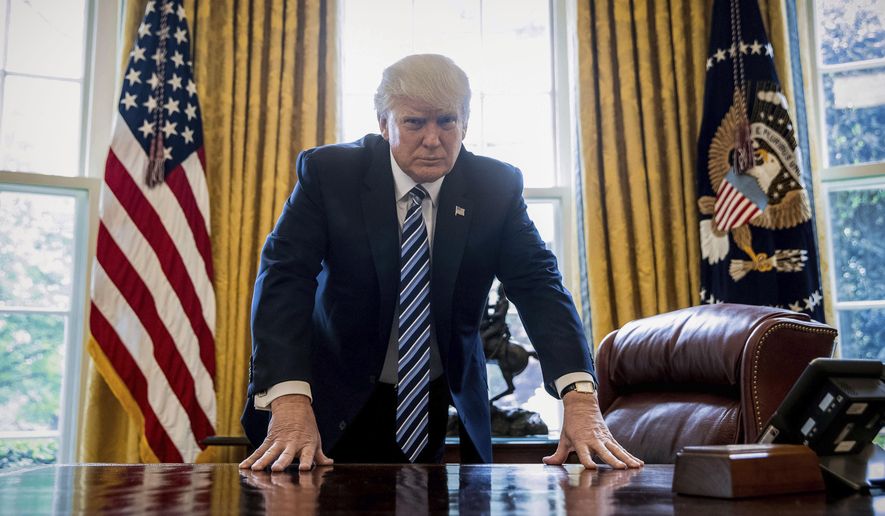President Trump reluctantly signed a Russian sanctions bill Wednesday, bending to the will of Congress as he slammed the legislation as “significantly flawed” and an affront to his executive powers.
The law punishes Russia, Iran and North Korea. But unsubstantiated accusations of Trump campaign collusion with Moscow loomed large because lawmakers, distrustful of the president’s relationship with the Kremlin, curtailed his ability to unilaterally lift the sanctions.
In a signing statement, Mr. Trump said the bill contained “clearly unconstitutional provisions,” and he chided lawmakers for hamstringing his executive authority.
He said it would “displace the President’s exclusive constitutional authority to recognize foreign governments.”
“While I favor tough measures to punish and deter aggressive and destabilizing behavior by Iran, North Korea and Russia, this legislation is significantly flawed,” he said in the message to Capitol Hill.
The check on his executive power raised doubts about whether Mr. Trump would sign the bill. He was forced to put is name on it, however, when the legislation passed with veto-proof majorities in both Republican-run chambers of Congress.
The law codifies financial and diplomatic sanctions for Russia’s annexation of Crimea and interference in the U.S. presidential election, as well as measures targeting Iran and North Korea for their destabilizing behavior on the world stage.
The law also requires congressional review for any sanctions that the White House wants to lift.
Mr. Putin has retaliated against the legislation by expelling 755 American diplomats from Russia, as relations between Washington and Moscow become strained.
“It’s impossible to endlessly tolerate this kind of insolence toward our country,” Mr. Putin said after the House passed the bill. “This practice is unacceptable. It destroys international relations and international law.”
After Mr. Trump signed the bill into law, the Russian Foreign Ministry said further countermeasures were possible.
Russian Prime Minister Dmitry Medvedev said on Facebook that the U.S. had declared a “full-scale trade war.”
He also taunted Mr. Trump, calling him weak and saying the U.S. establishment had defeated him.
“Trump’s administration has demonstrated total impotence by surrendering its executive authority to Congress in the most humiliating way,” Mr. Medvedev wrote.
He said the “American establishment has won an overwhelming victory over Trump” and describes the sanctions as “yet another way to put Trump in his place.”
Democrats’ allegations that the Trump campaign colluded with Russia, although unproved, have dogged Mr. Trump since he took office, overshadowed his accomplishments and distracted from his agenda.
The issue is being investigated by a Justice Department special counsel, the FBI and House and Senate committees.
Mr. Trump’s disdain for the legislation and frustration with Congress was palpable in the signing statement.
He said the law hamstrings his presidential authority and threatens the ability of the U.S. to work with allies to confront Russia. He also voiced concern about the potential damage to U.S. business interests in targeted regions.
Mr. Trump said he would implement the law as appropriate, a stance that echoed President George W. Bush’s hostile signing statements when he clashed with Congress.
“My Administration will give careful and respectful consideration to the preferences expressed by the Congress in these various provisions and will implement them in a manner consistent with the President’s constitutional authority to conduct foreign relations,” Mr. Trump wrote.
Senate Minority Leader Charles E. Schumer, New York Democrat, needled Mr. Trump about the signing statement, saying the president had been “far too soft on Russia” and that Congress would be keeping an eye on him.
“The president signing the legislation, although begrudgingly, was the right thing to do,” Mr. Schumer said. “The president’s extended signing statement, however, demonstrates that Congress is going to need to keep a sharp eye on this administration’s implementation of this critical law and any actions it takes with respect to Ukraine.”
House Speaker Paul D. Ryan, Wisconsin Republican, said the law sent a strong message to America’s foes that “they will be held accountable for their actions.”
The brief statement did not mention Mr. Trump’s signing statement. He said the U.S. will use “every instrument of American power to defend this nation and the people we serve.”
• S.A. Miller can be reached at smiller@washingtontimes.com.




Please read our comment policy before commenting.